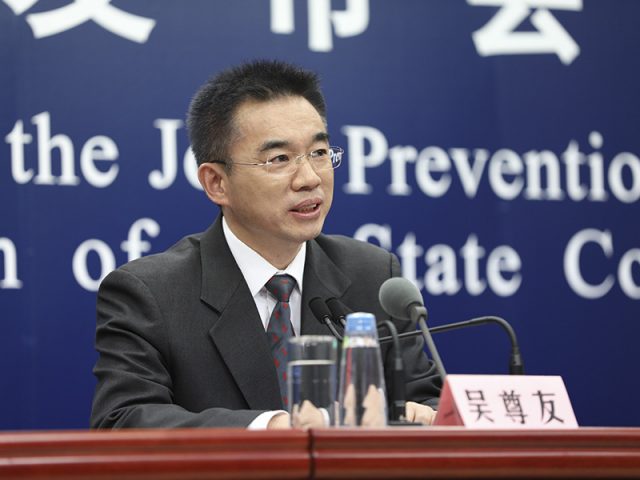A UCLA professor helped control China’s COVID-19 epidemic when it first emerged, but he worries about rising global COVID-19 cases.
Zunyou Wu, an adjunct professor of epidemiology in the UCLA Fielding School of Public Health and the chief epidemiologist of the Chinese Center for Disease Control and Prevention, was among the first scientists to study SARS-CoV-2, the virus responsible for the COVID-19 pandemic, when it first surfaced in Wuhan, China, in late December.
Wu assessed the movement and behavior of the virus, and made predictions about its spread after joining the response team. Wu also acted as a liaison for China when the World Health Organization visited the country during the epidemic.
The virus started spreading outside of China in December, according to WHO. Since then, there have been more than five million confirmed cases and 300,000 deaths due to COVID-19.
Although the news of the coronavirus was frightening to many, Wu said he was composed because of his experience working with viruses. In 2003, Wu advised China’s response to the severe acute respiratory syndrome outbreak, which was also caused by a coronavirus.
Roger Detels, an epidemiology research professor at the School of Public Health and Wu’s past professor, said Wu was one of the key individuals who developed and implemented China’s response to the epidemic.
Wu and his colleagues on the coronavirus response team sequenced the virus’ genetic structure by early January, allowing a diagnostic test to be developed weeks after China first identified the COVID-19 virus.
“That’s got to be the most rapid response on record to any unknown infectious disease,” Detels said. “(Wu has) played quite an important role in infectious diseases in China.”
Although China has managed to control the spread of the virus and has started reopening, Wu said he is still worried about COVID-19’s persistence in developed countries such as the United States.
Along with his response team, Wu began to host international video conferences with response teams from other countries to share their experiences and findings.
“The future is uncertain globally, but we do our best to control the epidemic in China and share our experience with other countries,” Wu said.
Wu hypothesized that COVID-19 would pan out in one of four possible scenarios.
COVID-19 might mimic the trajectory of SARS and become quickly controlled, or it could behave like a seasonal virus, such as the flu. It could, thirdly, also be a combination of the first two scenarios. COVID-19 might also persist until people have herd immunity or a vaccine, he said.
Although Wu has been deeply involved with the coronavirus efforts, he said his specialty lies in another type of virus – human immunodeficiency virus.
Wu, the Chinese CDC’s former director of HIV Prevention of the National Center for AIDS/STD Control and Prevention, has contributed to significant progress in HIV testing and treatment strategies.
He launched a nationwide HIV testing campaign in 2004 to increase Chinese people’s access to diagnostic testing and proper treatment.
“We changed society’s attitude (toward) HIV-infected individuals, particularly for people living with HIV themselves,” Wu said. “Once they (were) diagnosed as positive, they had antiretroviral therapy (and) they had hope for living, … stigma was significantly reduced … and slowly other countries gradually accepted the concept for testing.”
Jennifer McGoogan, an independent consultant, worked with Wu on his HIV and COVID-19 research. She said she commended Wu for his motivation to protect and ensure the health of Chinese people during various epidemics.
“Wu is just such a champion for the sick and the forgotten and the discriminated against,” she said.
Before Wu had become prominent in the public health sphere, he grew up in one of China’s least developed provinces, Anhui. He was born during the Cultural Revolution and credits the historical event for his education, he said.
“At the time, some high school graduates became teachers in the rural remote areas, so we actually benefited from (their education),” Wu said.
Wu went on to attend medical university to study public health and epidemiology before moving to the U.S. and pursuing a doctorate degree at UCLA. Virginia Li, a professor emerita of community health services at the School of Public Health, and Detels were presented with two candidates by the Chinese Ministry of Health for a scholarship program, ultimately choosing Wu to participate.
“I looked at the CVs, one is more laboratory orientated and the other was more public health orientated,” Li said. “Together, Dr. Detels and I selected (Wu), and that’s how he came to the United States and studied under Dr. Detels.”
Detels said he was proud of Wu’s development and professional journey. The pair have collaborated on numerous projects, transforming their once student-teacher relationship to that of colleagues, Detels said.
“Since (Wu) was my student, I’m very proud of him,” Detels said. “He’s obviously very intelligent, but … brilliance is not enough to have an impact. You have to put it into action. He is very much a doer.”

